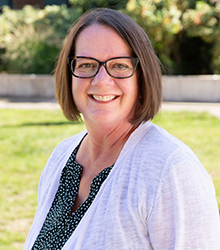
Deanne Unruh
Biography
Deanne Unruh, PhD, Research Professor at the University of Oregon. Dr. Unruh currently is the Co-Director of National Technical Assistance Center on Transition: the Collaborative. Her externally funded research focuses on high risk adolescents (e.g., youth with ED, juvenile justice involvement). Dr. Unruh has received external research funding from multiple entities including Office of Special Education Programs, Institute of Educational Sciences, and Office of Juvenile Justice and Delinquency Programs. In her role at the University of Oregon, she directs the Secondary Special Education and Transition (SSET) research unit. Her research expertise focuses on transition and re-entry practices for justice-involved adolescents with disabilities. Prior to coming to UO, Dr. Unruh was a teacher and administrator in alternative schools for marginalized youth in urban and under-resourced settings for more than 12 years.
Education
PhD, 2001, University of Oregon
Major: Educational Policy and Management
MS, 1991, University of Kansas
Major: Curriculum and Instruction
BS, 1985, University of Kansas
Major: Middle/Secondary Social Studies Education
Honors and Awards
2015 University of Oregon, Independent Researcher Award
2014 College of Education, University of Oregon, Distinguished Researcher Award
Publications
Unruh, D. K., Smolkowski, K., Gau, J., Reardon, K., Bromley, K. W., & Seeley, J. (accepted). Evaluation of an employability social skills intervention to improve community engagement skills among justice-involved youth: Ready for Wages. Journal of Correctional Education.
Unruh, D. K. & Reardon, K. (accepted). Employer perspectives on hiring youth previously involved with juvenile justice: A national survey. Manuscript submitted for publication at Education and Treatment of Children.
Mazzotti, V. L., Morningstar, M. E., Lombardi, A., Raley, S., Rowe, D. A., Poppen, M., Reardon, K., Carlson, S., Unruh, D., Monahan, J., Rousey, J. G., Vicchio, J. N., & Test, D. W. (in press). The Secondary Transition Fidelity Assessment: Conceptualizing a fidelity measure with input from the field. Career Development and Transition for Exceptional Individuals.
Unruh, D. Gomez, D., Slocumb, J., McCart, M., Davies, S., Harbaar-Krupa, J., Glang, A. (2022). Stakeholder experiences of students with traumatic brain injury: The effects of COFID-19 Pandemic and service delivery. Journal of School Health. DOI: 10.1111/josh.13280
Anderson, D., Gau, J. M., Beck, L., Unruh, D., Gioia, G., McCart, M., Davies, S. C., Slocumb, J., Gomez, D., & Glang, A. E (2021). Management of return to school following brain injury: An evaluation model. International Journal of Educational Research.
Reardon, K., Bromley, K. W., & Unruh, D. K. (2021). The Promise of Universal Design in Postsecondary Education: A Literature Review. Journal of Postsecondary Education and Disability, 34, 209-221.
Reardon, K. & Unruh, D. K. (2021). Universally Designed Learning in post-secondary education: A synthesized framework for supporting diverse learners. Journal of Faculty Development, 35, 27-33.
Sinclair, J., Unruh, D. K., & Kelly, K. (2020). Relationships matter: The role transition specialists play in a youth’s reengagement from the juvenile justice system. Career Development and Transition for Exceptional Individuals. Advance online publication. https://doi.org/10.1177%2F2165143420948838 Harwick, R., Unruh, D., & Lindstrom, L. (2020). What helps or hinders the transition to adulthood for youth with disabilities who experienced foster care? An ecological approach. Child Abuse and Neglect, 99, 104310. https://doi.org/10.1016/j.chiabu.2019.104310 Unruh, D., Waintrup, M., Alverson, C., Erickson, M., & MaGee, C. (2019). Stakeholders’ perspectives of re-entry to school and community for young offenders with disabilities: An ecological approach. Behavioral Disorders. https://doi.org/10.1177/0198742919891414
Research
Deanne Unruh, PhD, has directed or co-directed research and model demonstration grants and state contracts equaling $17 million. Her primary research interests include the facility-to-community transition process for adolescents in the juvenile justice system, development and validation of transition-related measures, and post-school outcomes for youth with disabilities.
